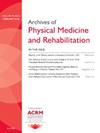对影响轻度至中度帕金森病患者体育锻炼和社区活动的因素进行因果中介分析。
IF 3.7
2区 医学
Q1 REHABILITATION
Archives of physical medicine and rehabilitation
Pub Date : 2025-06-01
DOI:10.1016/j.apmr.2024.10.012
引用次数: 0
摘要
目的研究已知的因果因素(运动自我效能感、平衡能力、行走能力)如何影响帕金森病(PD)患者的结果(中等强度的体育锻炼、进入社区的机会):通过直接途径、通过潜在的中介因素(非运动障碍)间接影响,或通过直接途径和中介途径共同影响:设计:利用随机对照试验中集合治疗组的基线和三个月数据进行因果中介分析:数据在两所大学的临床研究中心收集:138名帕金森病患者:干预措施:基于家庭和社区的步行和力量锻炼计划:暴露因素包括运动自我效能感、行走能力和平衡能力。潜在的中介因素包括疼痛、疲劳、情绪(焦虑、抑郁、情感、冷漠)、耻辱感和认知(执行功能和认知灵活性)。随访三个月的结果是身体活动和社区访问行为。每个因果因素-中介因素-结果组合都建立了独立的模型。为了尽量减少偏差,所有模型都根据已知的混杂因素(合并症、步态冻结、运动障碍严重程度和/或年龄)以及结果的基线值进行了调整:结果:步行持续时间的自我效能与中等强度体育锻炼之间存在直接和综合的因果关系(p.05)。结论:已知的因果因素对中等强度体力活动的影响并不明显:结论:已知的因果因素对身体活动和社区访问的影响不受非运动障碍的影响。步行自我效能感和步行能力仍是分别改善帕金森病患者体力活动和社区出入的主要干预目标。本文章由计算机程序翻译,如有差异,请以英文原文为准。
Causal Mediation Analysis of Factors Influencing Physical Activity and Community Access Among People With Mild-to-Moderate Parkinson Disease
Objective
To examine how known causal factors (exercise self-efficacy, balance, walking capacity) affect outcomes (moderate-intensity physical activity, community access) in people with Parkinson disease (PD): through a direct pathway, indirectly through potential mediators (nonmotor impairments), or through combined direct and mediated paths.
Design
Causal mediation analyses using baseline and three-month data from pooled treatment groups in a randomized controlled trial.
Setting
Data were collected at 2 university clinical research centers.
Participants
One hundred thirty-eight people with PD.
Interventions
Home and community-based walking and strength exercise program.
Main Outcome Measure(s)
Exposures were exercise self-efficacy, walking capacity, and balance. Potential mediators included pain, fatigue, mood (anxiety, depression, affect, apathy), stigma, and cognition (executive function and cognitive flexibility). The outcomes were physical activity and community access behavior at follow-up 3 months later. Separate models were developed for each causal factor-mediator-outcome combination. To minimize bias, all models were adjusted for known confounders (comorbidities, freezing of gait, severity of motor impairment, and/or age) and baseline values of the outcomes.
Results
Self-efficacy of walking duration had a causal relationship with moderate-intensity physical activity through direct and combined paths (P<.001). Walking capacity had a causal relationship with community access through direct (P=.03-.04) and combined (P=.02-.03) paths. Balance did not affect community access (P>.05). There were no significant mediation effects through indirect pathways for either outcome.
Conclusions
The effect of known causal factors on physical activity and community access was not mediated by nonmotor impairments. Walking self-efficacy and walking capacity remain the primary intervention targets for improving physical activity and community access, respectively, in people with PD.
求助全文
通过发布文献求助,成功后即可免费获取论文全文。
去求助
来源期刊
CiteScore
6.20
自引率
4.70%
发文量
495
审稿时长
38 days
期刊介绍:
The Archives of Physical Medicine and Rehabilitation publishes original, peer-reviewed research and clinical reports on important trends and developments in physical medicine and rehabilitation and related fields. This international journal brings researchers and clinicians authoritative information on the therapeutic utilization of physical, behavioral and pharmaceutical agents in providing comprehensive care for individuals with chronic illness and disabilities.
Archives began publication in 1920, publishes monthly, and is the official journal of the American Congress of Rehabilitation Medicine. Its papers are cited more often than any other rehabilitation journal.

 求助内容:
求助内容: 应助结果提醒方式:
应助结果提醒方式:


